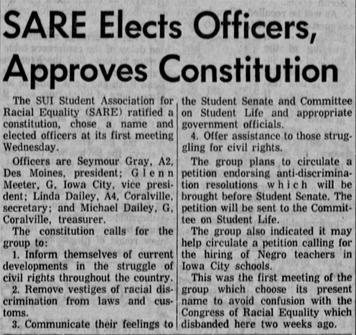Editor’s note: The Old Gold series provides a look at University of Iowa history and tradition through materials housed in University Archives, Department of Special Collections.
The quest for civil rights for African Americans in the mid-20th century reached new heights in 1964 when the Mississippi Summer Project, later known as Freedom Summer, was initiated by a coalition of rights groups known collectively as the Council of Federated Organizations.
Freedom Summer was an effort to register blacks in Mississippi to vote (the state at the time had the nation’s lowest percentage of such voters as a consequence of Jim Crow), establish Freedom Schools, and advocate for legal protections leading to the Voting Rights Act of 1965.
Mississippi’s black residents, long weary of the violence, intimidation, and threats preventing them from exercising their rights, were the project’s primary movers. They were assisted by 800 volunteers from around the country, many of them college students, for three months during the summer of 1964. Among them were about a dozen students from the State University of Iowa (for more details, read this Old Gold column).
Freedom Summer was not the only organized effort that attracted SUI students to Mississippi, however. Earlier that year, in March, a smaller group of Hawkeyes volunteered to do civil rights work in the South on their own. Old Gold only recently learned of this separate action, thanks to an oral history interview he conducted with Ed Spannaus (BA ’65) of Lovettsville, Virginia, in 2015.
Read more Old Gold columns in Iowa Now.
Spannaus, a white man, was one of six students—five white, one African American—who traveled from Iowa City to the Mississippi Delta region using a station wagon loaned by a faculty member. They were delivering books, clothing, and other donated materials to Itta Bena, a small town near Greenwood, Mississippi.
On the way, Spannaus recalls, the group decided to pull off to the side of the road around two or three in the morning, a couple of hours from their destination, to catch some shut-eye. The sole black passenger, Seymour Gray Jr. of Des Moines, was aware of the danger of traveling in Mississippi with a racially mixed group, so, to avoid confrontation with local white segregationists, Gray climbed up a tree, where he slept until sunrise. At daybreak, he rejoined the group.
Seymour Gray Jr. (1941–2013), who earned a bachelor’s degree from Iowa in 1965, is believed to have been the only African American student from the UI who participated in civil rights work in the South during this time. Old Gold regrets that he wasn’t aware of Gray’s contributions to the civil rights movement until after his death, but is now attempting to learn as much as possible about him and his life’s work.
We do know that Gray grew up the midst of Des Moines’ lively jazz scene during the 1940s and 1950s. His father and uncle, Seymour and Howard Gray, owned the Sepia Club on Center Street, where nationally renowned musicians as well as local artists performed, a favorite stop between Chicago and Kansas City. In 2007, the Gray brothers were inducted into the Des Moines Community Jazz Center Hall of Fame.

Seymour Jr. entered SUI in the fall of 1961. A founder of SARE (Student Association for Racial Equality) in 1962, he embraced student governance as a vehicle for political activism. He served on the Student Senate Judiciary Committee during his junior year, and was a member of Young Democrats. Just weeks before graduating, in March 1965, he participated in a hunger strike in front of the Iowa City post office downtown in support of civil rights workers in Selma, Alabama.
After graduating with a BA, Gray was awarded an LLB (Bachelor of Laws) from the University of Ghana, Legon. He published an article, “Investing in Ghana,” in the July 1977 issue of Black Enterprise. He later returned to the U.S. He died in Des Moines on Dec. 26, 2013, at age 72.
Old Gold would like to hear from alumni and friends who knew Gray. Contact David McCartney at david-mccartney@uiowa.edu to share any memories or documents you might have. Your recollections can help us better understand the circumstances of that time.